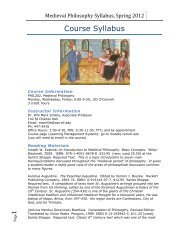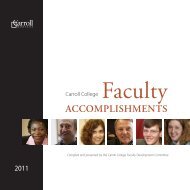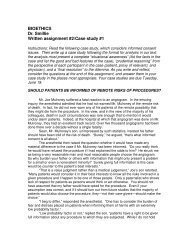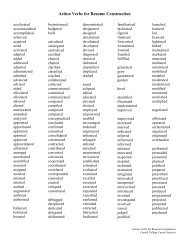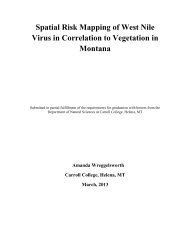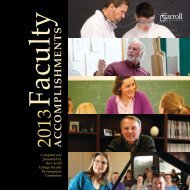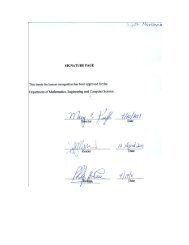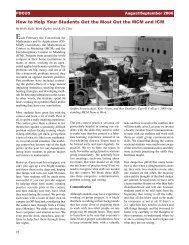Business Ethics Syllabus - Carroll College
Business Ethics Syllabus - Carroll College
Business Ethics Syllabus - Carroll College
Create successful ePaper yourself
Turn your PDF publications into a flip-book with our unique Google optimized e-Paper software.
<strong>Business</strong> <strong>Ethics</strong> <strong>Syllabus</strong> 2012<br />
<strong>Business</strong> <strong>Ethics</strong> <strong>Syllabus</strong><br />
<strong>Business</strong> <strong>Ethics</strong>, Phil207<br />
Tuesday and Thursdays, 9:30-10:45am, 102 O’Connell<br />
3 credit hours; no prerequisites<br />
Dr. Wm Mark Smillie, Associate Professor<br />
Office Hours: 9:00-10:00, MW; 3:00--4:30, MWTh and by appointment<br />
142 St Charles Hall | Email: msmillie@carroll.edu | Ph: 447-5416<br />
Coursepage: go to moodle2.carroll.edu (moodle2 button on students page)<br />
READING MATERIALS<br />
Deni Elliot. Ethical Challenges: Building an <strong>Ethics</strong> Toolkit Authorhouse: 2008. ISBN: 1-4343-<br />
8802-6. New $21.20 @ Saints Shoppe. Required text. This is an introduction to ethics and<br />
ethical thinking, which includes twenty activities to help you understand ethics. I chose this<br />
book because it offers an interactive approach to get everyone thinking, and because it stresses<br />
the very basics of ethical action—values, the nature of responsibility, the difference between<br />
ethics and other practical considerations, the nature of systematic moral analysis, the basics of<br />
moral life and growth.<br />
Al Gini and Alexei Marcoux. The <strong>Ethics</strong> of <strong>Business</strong>: A Concise Introduction. Rowman and<br />
Littlefield, 2012. ISBN: 978-0-7425-6162-5. New, $24.95 @ Saints Shoppe. New, short and<br />
sweet introduction to <strong>Business</strong> <strong>Ethics</strong> that focusses on establishing a “few good principles” that<br />
would create ethical action in business.<br />
Various. Several articles about business ethics that are available for you on Moodle. You are<br />
responsible for accessing these and printing out a copy for class.<br />
Page1<br />
COURSE DESCRIPTION<br />
How should a person who wants to act ethically do business? Does ethics even have a place<br />
in business activity? To answer these questions, and we shall consider the nature and goals<br />
of ethical activity itself, as well as whether business activity requires ethical activity. The
<strong>Business</strong> <strong>Ethics</strong> <strong>Syllabus</strong> 2012<br />
focus promises to be very personal—in identifying virtues that make business possible, we<br />
identify the habits that individual people doing business (all of us!) must develop in order to<br />
do business ethically. We are also interested in understanding how these virtues should<br />
actually be practiced in the midst of competitive business activity. Specific issues we shall<br />
consider include the importance and nature of trust, the role of honesty, reasons for<br />
personal self-control, and how the market can be a setting of justice. We shall aim to be<br />
realistic about these questions—realistic about business but as realistic about ethics too!<br />
STUDENT LEARNING OBJECTIVES<br />
Students taking this course will learn to<br />
• Identify ethical elements required for business activity<br />
• Develop and broaden their understanding of how ethical activity within business<br />
• Develop habits of critical 1 analysis of philosophical ideas and positions<br />
• Develop a tolerance for ethical disagreement and ambiguity.<br />
Disclaimer:<br />
1) Students may vary in their competency levels on these abilities.<br />
2) Students can expect to acquire these abilities only if they honor all course policies,<br />
attend class regularly, complete all assigned work on time and in good faith, and<br />
meet all other course requirements and expectations.<br />
GRADED COURSE REQUIREMENTS<br />
Article and chapter analyses: The purpose of our class meetings is to converse about the<br />
readings. One-page (no more/no less) summaries of selected articles or chapters are<br />
assigned throughout the semester to encourage your preparation for class. These are due<br />
prior to the class in which the article/chapter is discussed. No late assignments will be<br />
accepted. At the end of semester, two lowest scores will be dropped.<br />
(<strong>Business</strong>) <strong>Ethics</strong> at the Movies (Ethical Reviews). One review of movie from the approved<br />
list of business ethics movies, presented to the class in a “pechka-kuchka” style power-point<br />
presentation. These are graded on the following three areas: (1) following the pechkakuchka<br />
style (20 slides, set to automatically advance every 20 seconds, slide content<br />
pictorial and avoiding excessive text) 10 points; (2) plot summary (not more than half the<br />
presentation, coherent ) 10 points; (3) ethical analysis (relevant, sophisticated, complex<br />
consideration of issues, reasonable and justified reactions from speaker) 20 points. Turn a<br />
printed out copy of just your slides (use “handout” option in print command, six slides to a<br />
page) either at your presentation, or in “pdf” format on Moodle.<br />
Presentations: Group assignments, instructions to follow. Presentations during the last<br />
week of semester.<br />
Page2<br />
Tests and Exams. There will be a midterm and a final exam. These tests will cover the<br />
material in the texts and covered in class sessions. The final is cumulative.<br />
1 “Critical” as used in philosophy means to carefully take apart, examine, try to understand and to make<br />
better. It isn’t a way of being negative about things.
<strong>Business</strong> <strong>Ethics</strong> <strong>Syllabus</strong> 2012<br />
Weighting System<br />
Article analyses: 35%<br />
At the Movies: 15%<br />
Presentation: 25%<br />
Midterm Exam: 10%<br />
Final Exam: 15%<br />
Final grade calculation: All points earned for each type requirement will be added according<br />
to the specified weight, to total 100. Letter grades for the course will be assigned as follows.<br />
(You can “track” your grade throughout the semester on moodle.)<br />
Percentage points<br />
90-100…………………<br />
80-89………………….<br />
70-79………………….<br />
Grade<br />
A<br />
B<br />
C<br />
Percentage points<br />
60-69…………………<br />
Below 60……………<br />
P/F Grade………….<br />
Grade<br />
D<br />
F<br />
D (60)<br />
PREVIEW OF CLASS ACTIVITIES<br />
As already mentioned, the purpose of our class meetings is to talk about, examine<br />
and understand the readings. Sometimes you will be required to turn in a summary of the<br />
class reading prior to class. However, at all times, you are still expected to read the<br />
assignment and come to class prepared to discuss it. Philosophical readings can be<br />
challenging and the point is not to skim them quickly before class, but to try to think<br />
through them and with them. Give yourself enough time to do this. Take notes on the<br />
reading as you read; try to identify main points, and most importantly, the arguments<br />
provided to support those points. Note areas that you don’t understand; write down<br />
questions and even your feelings as you read. Try to formulate a response to the arguments<br />
that you find—do you agree, disagree? Completely or partly? I recommending not<br />
highlighting in your book at all: underline in pencil, write notes in the margins, and later<br />
summarize in outline notes of your own. And always bring your book to class!<br />
Talking: Maybe the most important part of a philosophy class is talking. Talking is<br />
thinking; you are encouraged to talk because I want you to think, and it is too easy to not<br />
think when we just keep everything inside. Many of you might find talking in class unusual,<br />
awkward, difficult, scary, or even embarrassing. One thing to remember is that all of us<br />
have the same fears. Everyone should try to challenge themselves to speak just a little more<br />
than they would have on their own (even if your voice shakes). I hope that we all will get<br />
used to talking with each other in class, and will do my best to make talking in class safe for<br />
all of us by learning how to express disagreement with respect and tact.<br />
COURSE POLICIES<br />
Page3<br />
Attendance and Tardiness<br />
Regular attendance is a college policy (see <strong>College</strong> Catalogue, pg 40). I keep attendance<br />
regularly and expect to be informed if some legitimate excuse keeps you from attending<br />
class. Students missing more than nine class sessions may be asked to drop the class.<br />
Tardiness is disruptive to other members of the class, so please be on time!
<strong>Business</strong> <strong>Ethics</strong> <strong>Syllabus</strong> 2012<br />
Late exams/assignments: Assignments are considered late if they are turned in after 5:00<br />
of the day they are assigned. Late assignments will be penalized one half a letter grade for<br />
every day they are late. Missed exams may be retaken at the ARC within one week of the<br />
exam date. (Students must make their own arrangements with the director of the ARC, and<br />
then inform me of their scheduled makeup date.)<br />
Students having good reasons for missing a deadline or test should contact me in<br />
advance of the deadline. Good reasons include documented medical reasons, documented<br />
court obligations, and athletic team commitments, family emergencies. Deadlines will be<br />
reset to mutually agreed times in these situations.<br />
Academic Honesty<br />
<strong>Carroll</strong> <strong>College</strong>’s policy on Academic Integrity is stated in both the CC Catalogue and in the<br />
Student Handbook. The policy reads: “Students at <strong>Carroll</strong> <strong>College</strong> are expected to have high<br />
standards of integrity. Any student who cheats or plagiarizes on examinations or<br />
assignments, falsifies college records, or fails to give requested academic information on<br />
admission documents is subject to dismissal or other appropriate disciplinary action by the<br />
<strong>College</strong>.” Students violating the policy will be referred to the Vice President for Academic<br />
Affairs. Please see these publications for the correct procedures to follow if you have<br />
questions concerning the conduct of this class or the grading procedures (other than a final<br />
grade).<br />
Plagiarism is an act of fraud and will not be tolerated. Plagiarism is both stealing<br />
someone else’s work and lying about it. It includes the following<br />
• Turning anyone else’s work (including other students’) as your own<br />
• Copying without giving credit (including copying from the internet)<br />
• Not putting quotations in quotation marks<br />
• Incorrectly identifying the source of a quotation<br />
Plagiarism also includes copying the sentence structure of a source, even if you changed<br />
words, and copying so many words or ideas from a source that it makes up the majority of<br />
your work, whether you give credit or not.<br />
All suspected cases of plagiarism will be investigated, and where verified, will be<br />
penalized; the penalty can be a severe as immediate failure in the course. If you are unsure<br />
about whether some actions constitute plagiarism, please ask me.<br />
Campus support services<br />
If you believe that you may need an accommodation based on the impact of a disability,<br />
please contact Kevin Hadduck, in order to discuss your specific needs and to determine a<br />
reasonable accommodation plan. You may contact Kevin Hadduck in the Academic Success<br />
and Disability Services Office, Borromeo Hall, Room 118 (phone: x4504; email:<br />
khadduck@carroll.edu).<br />
Page4
<strong>Business</strong> <strong>Ethics</strong> <strong>Syllabus</strong> 2012<br />
BUSINESS ETHICS COURSE CALENDAR 2011<br />
Page5<br />
DATE<br />
Aug 28<br />
Aug 30<br />
Sept 4<br />
Sep 6<br />
Sep 11<br />
Sep 13<br />
Sep 18<br />
Sep 20<br />
Sep 25<br />
Sep 27<br />
CLASS SUBJECT/ASSIGNMENT…<br />
Introduction to the Course.<br />
What is business? What is ethics? Reading assignment: The ethics of<br />
business, chs 1-2; Ethical Challenges, Introduction and Chapter 1, pgs<br />
1-17. Writing assignment: write a summary of <strong>Ethics</strong> of <strong>Business</strong>, Ch<br />
2—due before class.<br />
What is ethics, Continued. Reading assignment: Ethical Challenges,<br />
Chs 2-3, pgs 19-44. We will discuss the activities in class.<br />
<strong>Ethics</strong> in <strong>Business</strong>. Reading assignment: The <strong>Ethics</strong> of <strong>Business</strong>,<br />
chapter 3, pgs 33-50. Writing assignment: write a summary of <strong>Ethics</strong><br />
of <strong>Business</strong>, Ch 3—due before class.<br />
The Good life as the goal of ethics. Reading assignment: Aristotle on<br />
the Good Life (Moodle), Epicurus on Pleasure (Moodle) and Advice<br />
from Aristotle by James O’Toole (moodle). In class: Video on virtue<br />
ethics. Writing assignment: write a summary of one of these articles—<br />
due before class.<br />
Is it possible to find ethics in business? Reading assignment: The<br />
<strong>Ethics</strong> of <strong>Business</strong>, chapter 4, pgs 51-66.<br />
Finding <strong>Ethics</strong> in <strong>Business</strong>: Reading assignment: Ian Maitland,<br />
“Virtuous Markets: the market as a school of the virtues” and Bill<br />
Shaw, “Sources of Virtue” [Available on moodle] Writing assignment:<br />
write a summary of Maitland—due before class.<br />
<strong>Business</strong> values—or not: is greed good? Reading assignment:<br />
Solomon Schimmel, “Greed” [avail on moodle]. In class: We will<br />
watch and discuss a video called “Is Greed Good.” Writing assignment:<br />
turn in a summary of the video by Sept 23.<br />
Trust and Truth. Reading assignment: Chapter 5 of The <strong>Ethics</strong> of<br />
<strong>Business</strong>.<br />
Oct 2 Lying in <strong>Business</strong>. Reading assignment: Is it ever right to lie?”<br />
“There’s no lying in Baseball (Wink, wink)” [On Moodle]. Writing<br />
assignment: write a summary of one of these articles—due before class.<br />
Oct 4 Test #1<br />
Oct 9<br />
Oct 11<br />
Oct 16<br />
Oct 18<br />
Midsemester Break<br />
Truth in Advertising. Video presentation.<br />
Advertising and consumer manipulation? Reading assignment: “The<br />
Dependence Effect” and “The Inconclusive Ethical case Against<br />
Manipulative Advertising.” [On moodle] . Writing assignment: write a<br />
summary of one of these articles—due before class.<br />
Competition and Self-Control. Reading assignment: Chapter 6 of<br />
The <strong>Ethics</strong> of <strong>Business</strong>. Edward Garcia, “The Winner-Take-All Game.”
<strong>Business</strong> <strong>Ethics</strong> <strong>Syllabus</strong> 2012<br />
DATE<br />
Oct 23<br />
Oct 25<br />
Oct 30<br />
Nov 1<br />
Nov 6<br />
Nov 8<br />
Nov 13<br />
Nov 15<br />
Nov 20<br />
Nov 27<br />
Nov 29<br />
Dec 4<br />
Dec 6<br />
Dec 10<br />
CLASS SUBJECT/ASSIGNMENT…<br />
Writing assignment: write a summary of Chapter 6—due before class.<br />
Bluffing in <strong>Business</strong> Reading assignment: “Is <strong>Business</strong> Bluffing<br />
Ethical?” “Does it pay to Bluff in <strong>Business</strong>?” Writing assignment: write<br />
a summary of one of these articles—due before class.<br />
Sales ethics. Reading assignment: “The <strong>Ethics</strong> of Sales.” [on<br />
moodle].<br />
Loyalty. Reading assignment: Chapter 7 of The <strong>Ethics</strong> of <strong>Business</strong>.<br />
Writing assignment: write a summary of Chapter 7—due before class.<br />
Justice and Fairness: Respect for Persons. Reading assignment:<br />
“The Ring of Gyges.” “Respecting the Humanity in a Person.” “Justice<br />
Ruins the Market” [on moodle]. Writing assignment: write a summary<br />
of one of these articles—due before class.<br />
Shopping at Walmart: Is it ethical? Reading assignment: “Is it Ethical<br />
to Shop at Walmart.” “The Real Facts about Walmart.” In class:<br />
viewing video. Writing assignment: write a summary of “Is it Ethical to<br />
Shop …”—due before class.<br />
Shopping at Walmart: Is it ethical? Discussion day.<br />
Work-Life Balance. Reading assignment: Chapter 8 of The <strong>Ethics</strong> of<br />
<strong>Business</strong>. “Leisure, the Basis of Culture.” Writing assignment: write a<br />
summary of Chapter 8—due before class.<br />
Big <strong>Business</strong>. Reading assignment: Chapter 9 of The <strong>Ethics</strong> of<br />
<strong>Business</strong>. Writing assignment: write a summary of Chapter 9—due<br />
before class.<br />
Big <strong>Business</strong>. Reading assignment: TBA<br />
Nov 22--Thanksgiving Break<br />
Good Leaders. Reading assignment: Chapter 10 of The <strong>Ethics</strong> of<br />
<strong>Business</strong>. Writing assignment: write a summary of Chapter 10—due<br />
before class.<br />
Group Presentations<br />
Group Presentations<br />
Final Day: Presentations, surveys, review for final<br />
Final Exam: 8:00-9:45pm (Mon). Final is Cumulative<br />
Disclaimer: The above schedule, policies, and assignments in this course are subject to<br />
change in the event of extenuating circumstances or by mutual agreement between the<br />
instructor and the students.<br />
Page6<br />
GENERAL<br />
Every student must log onto Moodle ASAP (see Students page on <strong>Carroll</strong> website) and<br />
“enroll” in this course. The moodle site includes copies of this syllabus, and other reading<br />
assignments not available in the book store. All written assignments should be submitted<br />
on moodle. All assignments will be graded on moodle—go there to view your grade and<br />
comments from the instructor. The moodle grade book is my grade book for this course;
<strong>Business</strong> <strong>Ethics</strong> <strong>Syllabus</strong> 2012<br />
all your grades will be recorded there. (If something is incorrect or missing, you should<br />
contact me.) The moodle calendar is the official calendar for the course as well—it will<br />
include reading assignments as well as other assignments.<br />
All students should practice good manners in class and show civility to all. A positive<br />
attitude is appreciated and a professional demeanor should be the baseline. This includes<br />
such things as remaining alert (and awake!) in class, respecting and never interrupting<br />
others, limiting private conversations, and keeping phones and pagers off.<br />
In team or group situations, students should cooperate with their team members and obtain<br />
their input when working on group exercises and projects. Most group work involves a<br />
required peer assessment of each individual’s contribution to the group.<br />
Absolutely no electronic devices are allowed during exams, and this includes cell phones<br />
and laptop. Laptops are allowed at other times during class, with the expectation that you<br />
are using them to participate in the class and not as a distraction.<br />
BACKGROUND INFORMATION ABOUT YOUR INSTRUCTOR<br />
I am an associate professor in the Philosophy Department. I received a B.A. from Thomas<br />
Aquinas <strong>College</strong> (CA) in 1983; a Ph.D. in 1992, from the University of Notre Dame. I have<br />
taught at Notre Dame, Merrimack <strong>College</strong> (North Andover, MA), North Shore Community<br />
<strong>College</strong> (Danvers & Lynn, MA), Allentown <strong>College</strong>, (Center Valley, PA), the University of<br />
Indiana at South Bend, and Bethell <strong>College</strong> (Mishawaka, IN).<br />
I teach various philosophy courses here at <strong>Carroll</strong> including Philosophy of Human<br />
Nature, <strong>Business</strong> <strong>Ethics</strong>, Bioethics, Environmental <strong>Ethics</strong>, and Medieval Philosophy. My<br />
research interests are in Medieval Philosophy, especially the philosophy of St. Thomas<br />
Aquinas, and applied ethics. I have given papers/presentations on: Catholic Identity, St.<br />
Thomas on God’s Omnipotence, End of Life Decision-Making, using technology in the<br />
classroom (including Moodle).<br />
I’ve been married 26 years and have eight kids (including a <strong>Carroll</strong> grad, class of<br />
2008!). I am involved in various community organizations in Helena and enjoy visiting<br />
historical sites, hiking, photography, building things from time to time (and even house<br />
remodeling).<br />
Page7



